In this article, you will learn of the top 10 best AI tools, showing you their features and how they can boost your business.
It’s tougher than ever to stay ahead in today’s super-fast business world.
More and more companies are using AI to work smarter, get more done, and make better decisions.
These tools cover everything from customer service to data analytics, helping businesses innovate and improve.
I want to show you tools that actually save time, cut costs, and make things better.
These tools can help with customer engagement, teamwork, and data – whatever your business needs.
You’ll learn which ones are most valuable in different categories of your business, and how to get started.
Table of Contents
- 1 AI Tools on Business Development and Management
- 2 AI Tools for Market Research
- 3. AI Tools to Write Business Plan
- 4. AI Tools for Naming
- 5. AI Tools for Graphics Design
- 6. AI Tools for Digital Marketing
- 7 AI Business Analytics Tools
- 8 AI Tools for Business Presentation
- 9. AI Tools for Video Editing
- 10. AI Tools for Image Generation
- 4 Major Importance of AI Business Tools: Why It Matters
- Conclusion
- Frequently Asked Questions
1 AI Tools on Business Development and Management
No matter your size, this list of smart AI tools can revolutionize your business with better workflows, personalized customer service, and streamlined operations.
AI is big time changing the way business gets done: things are smoother, decisions are better, and customers happier.
AI tools like HubSpot make for better lead targeting, thus ultimately driving more sales for the marketing and sales teams.
For instance, Marketo automates campaigns, lets you target specific groups, and follows up on results—making marketing much more efficient.
Chatbots like Intercom and Drift offer customer support 24*7, answering questions and solving small problems in an instant.
They save time, and customers just love the immediate support.
AI-powered platforms like Monday.com go well for business process management.

These help teams follow up on tasks, make resource allocations, and project timeline estimations comparatively easier.
Similarly, AI software like BambooHR makes hiring easier, predicts which employees are likely to quit, and helps in improving work conditions.
AI powered application tools, like QuickBooks, help businesses with money management and other related tasks, thereby automating accounting, preparing reports, and even predicting the cash position.
Programs like Watson take in data on demand and provide better prediction, manage your inventory, and cut supply chain costs.
These above mentioned AI tools have been helping in better decision making for your businesses, reduce busy work and efficiently make time for its growth and competitive advantage.
2 AI Tools for Market Research
Knowing your customers is key for any business—it helps you predict what’s next and make better choices.
You’re lost without it. The right info helps you boost products, refine marketing, and crush the competition. It’s key to know what customers want and be ahead of the trends.
AI tools have made market research much easier and more efficient.
For instance, CrowdfireApp-a social listening tool crawls millions of posts, blogs, and online forums for hot trends and customers’ sentiments in real time, so you’re able to move with the times.

When there’s some new trend commencing in your industry, this tool is going to let you know before this gets big.
Another example of powerful AI tools is SurveyMonkey. They have integrated AI that can help analyze survey data. Instead of manually doing the crunching, it brings in patterns and suggests insights.
This is a game changer for a small business that needs speed and insights from customer feedback but without a large team for analysis.
Another super helpful free tool is Google Trends. It tracks search data across various regions to help businesses understand what people are searching for and how demand is shifting.
It’s useful for spotting market opportunities or evaluating the effectiveness of your current campaigns.
These AI tools save time, cut out the guesswork, and give businesses real, actionable insights that can boost growth and reduce risk.
3. AI Tools to Write Business Plan
AI tools have made writing business plans so easy.
A business plan provides focus, funding, and guidance. Without one, there will be short-term success.
A good example can be LivePlan: Using AI, it helps you structure your plan and automatically builds financial forecasts based on your input.
It saves you a lot of time, so you won’t miss anything important.

Another tool, Enloop, will give you an AI-powered score showing just how good your plan is. It analyzes your text and financials among others for feedback.
According to a study, businesses that keep a written plan are 16% more likely to succeed.
AI helps create a clear and data-driven business plan to set you up for growth-makes that dream of scaling so much more achievable!
4. AI Tools for Naming
Huge for your business naming-it’s the first impression and it sets the tone to your brand.
A great name can make you memorable, while a poor one might leave people confused or forgetful.
AI tools can help you nail this down. Namify is one of the AI business name generator tools that perfectly fuses creativity with market research.
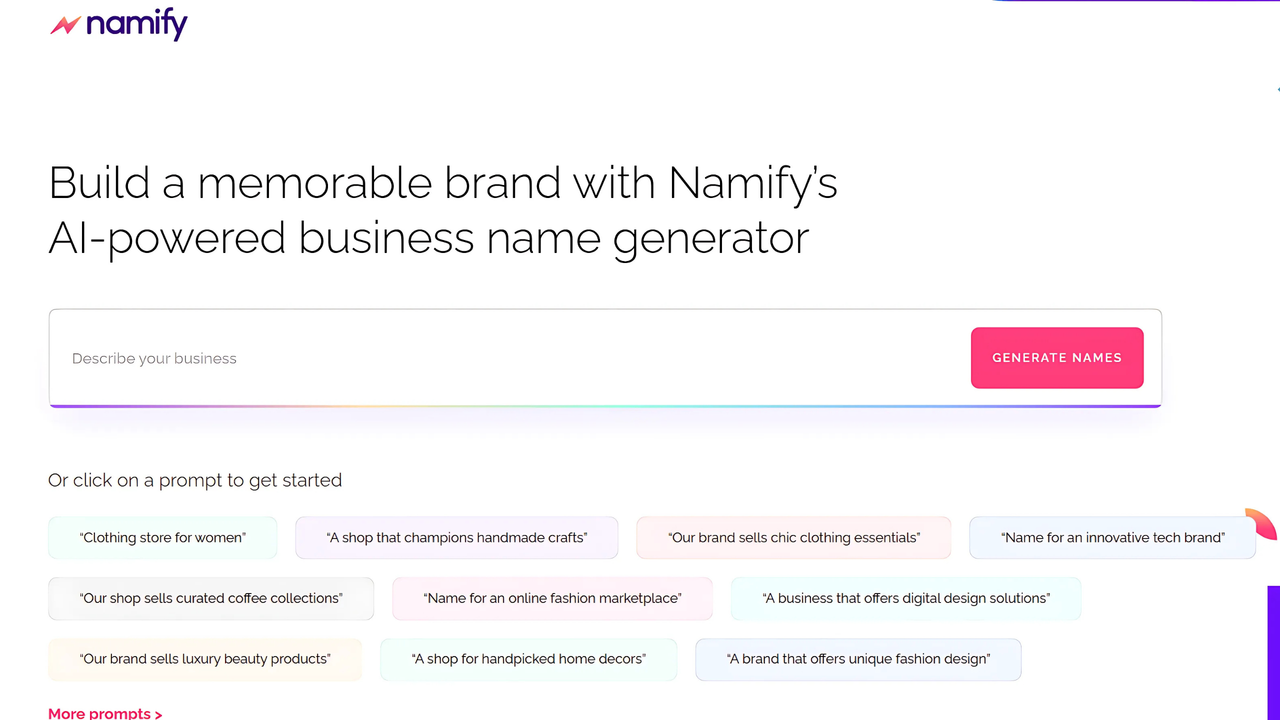
The tool gives recommendations for names based on keywords and even checks domain availability to prevent last-minute hustle.
BrandBucket is another marketplace that allows pre-vetted business names to be put out for sale, with their domains available.
This saves time and could help you find a name that best suits the taste of your audience.
In fact, strong and memorable names have been proven to make companies grow 3-5x faster than those with weak or unclear ones.
You will have this edge with an AI tool and thus set your business up for success from the very start.
5. AI Tools for Graphics Design
Graphic design helps companies in all the visual ways you communicate your brand and differ from others.
Not a single detail is too small to be noticed in customer perception: from logotype to social media posts, to website design. AI took this art to another dimension.
Canva is just one of those go-to places for many small businesses.
It offers templates, smart resizing, and design suggestions-all thanks to AI-so you don’t need to be a design pro to create something eye-catching, plus super fast.
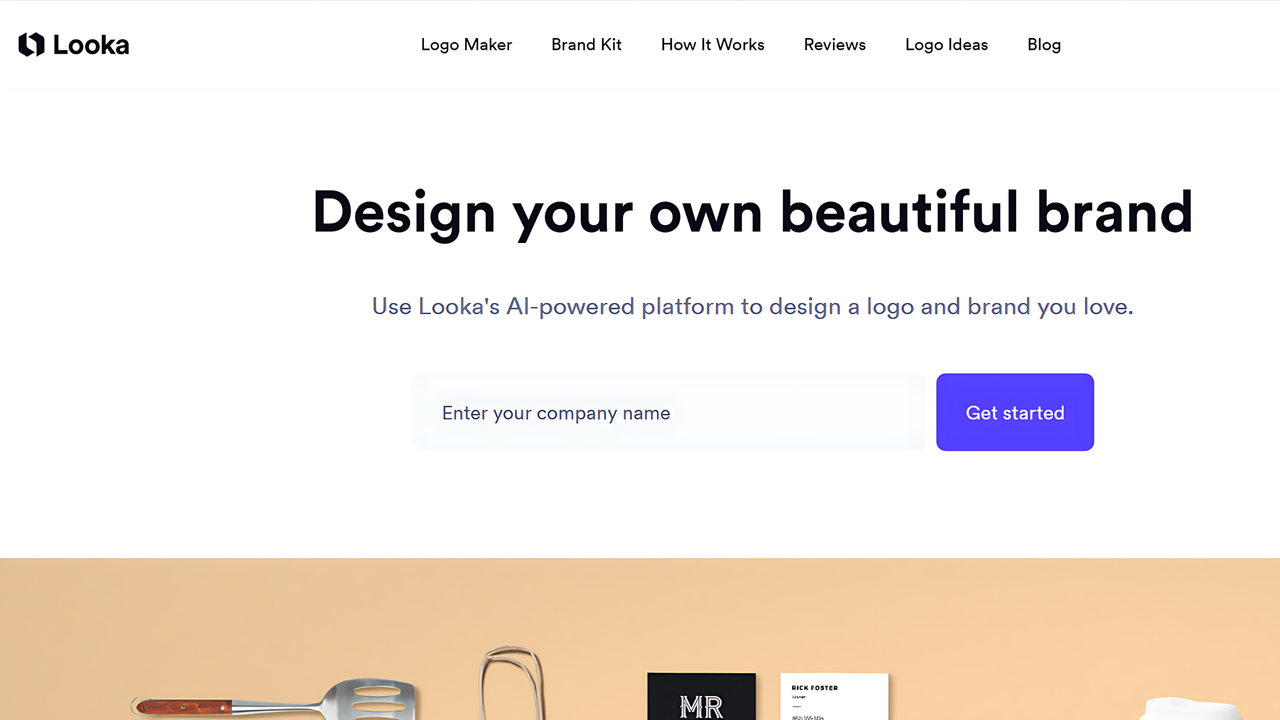
There’s also the AI design tool Looka, making sure your logo is professionally designed, taking in consideration your preference and industry, in a matter of minutes.
Visuals are proven to be processed 60,000 times faster than text alone; therefore, with AI, ramping up your graphics will increase brand recognition and engagement as much as 80%.
AI makes design easier to access, which should save time and money while amping up your brand.
6. AI Tools for Digital Marketing
But, above all, digital marketing is important for any business nowadays.
That’s how you connect with people online. The right online marketing strategies will get you more known, more sales, and more customers.
It’s simple: AI tools will be a game changer.
The HubSpot platform really shines with its automated marketing campaigns, lead nurturing, and emails—it saves time and gets you to the right people.
Yet another highlight would be Hootsuite, making use of AI to optimize how one posts on social media and then analyzing that performance to make sure you get the best possible engagement.
AdRoll will help in designing personalized ads with AI-driven data for the re-targeting of customers who take an interest in your products, showing as high as 60% more conversions as research has shown.
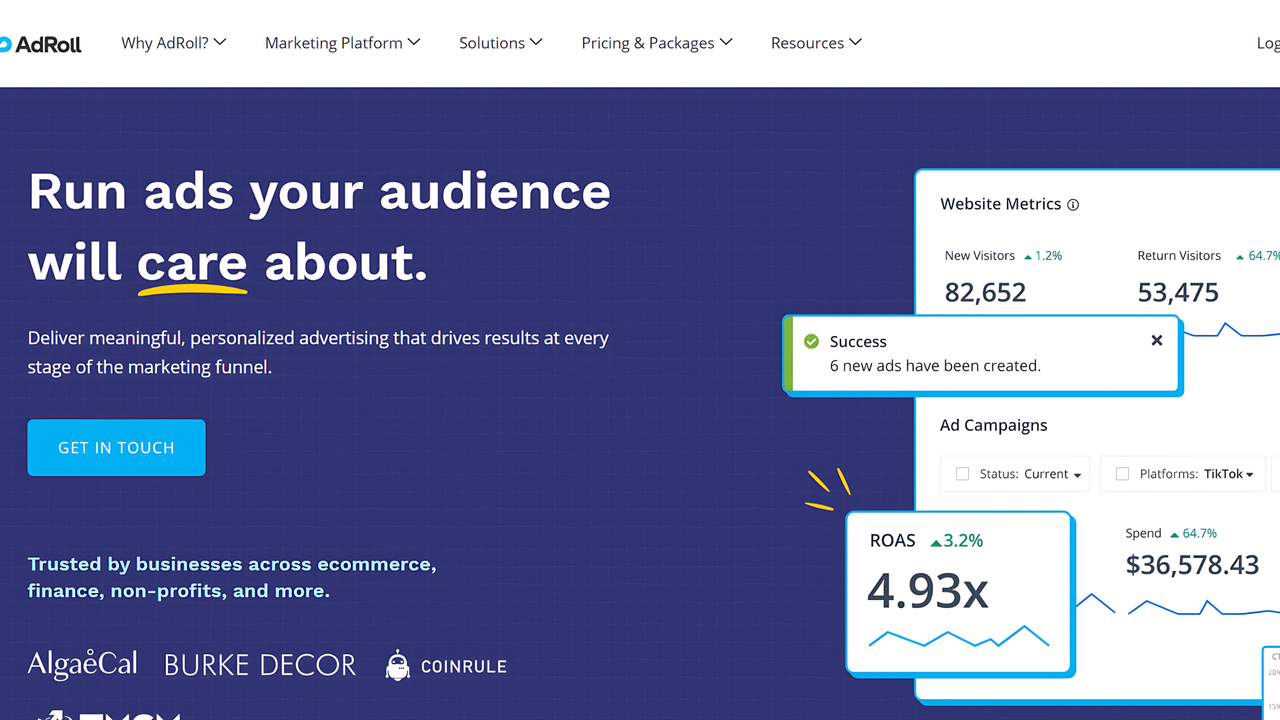
Digital marketing, run by AI tools, did manage to make targeting easier and more efficient; it grew a lot faster. Without this, you will be just missing a big opportunity!
7 AI Business Analytics Tools
Seriously, data analysis is one of the categories of business you can use this list of best AI tools. It’s all about the data, whether you’re marketing or dealing with customers.
Without analyzing that data, you’re just making guesses.
Proper data analysis helps you uncover patterns, forecast trends, and make informed decisions that can literally change the game for your business.
Consider, for instance, an e-commerce store replete with website data, cart abandonment rates, and customer demographics.
It’s a nightmare trying to sift through all this information manually.
And this is where AI market research and data analysis tools come into play, as they lighten the load. Take, for example, Tableau.
It’s a powerful tool which can visually present information in understandable forms from complex data.
You can spot trends as they’re happening, be it tracking sales performance or identifying the top products.
A study shows that using tools like Tableau improves business decisions by 20-30%. That’s a big win!
Then, there’s also Google Analytics.

This is a great one if you’re into digital marketing strategies. You can track how customers behave on your site: their source, clicks, and drop-off points.
This will in the process assist you further in tweaking your marketing strategy to improve the rates of conversion.
Those companies using Google Analytics tend to realize a 30% higher ROI in their digital campaigns.
For the more intricate stuff, Power BI from Microsoft is another gem. It integrates almost with any data source and does AI-influenced analysis for you for speedier results.
Using Power BI, you will predict future trends and adjust on the fly-super helpful if you’re in a fast-moving industry.
Without them, it’s like trying to drive blindfolded-no thanks!
8 AI Tools for Business Presentation
Presentations mean everything when it comes to business: pitching ideas, securing investments, updating on key events-you name it.
A well-designed presentation may engage the audience and help drive the message home.
Since a person remembers 65% of the information with visuals, then you need to do it properly.
AI tools are here to make slide creation easy. Beautiful.ai helps you design stunning presentations quickly, with smart templates and design suggestions that keep everything looking professional.
Tome takes it up a notch by using AI to create entire presentations in minutes, analyzing your content and suggesting slides that best fit your message.
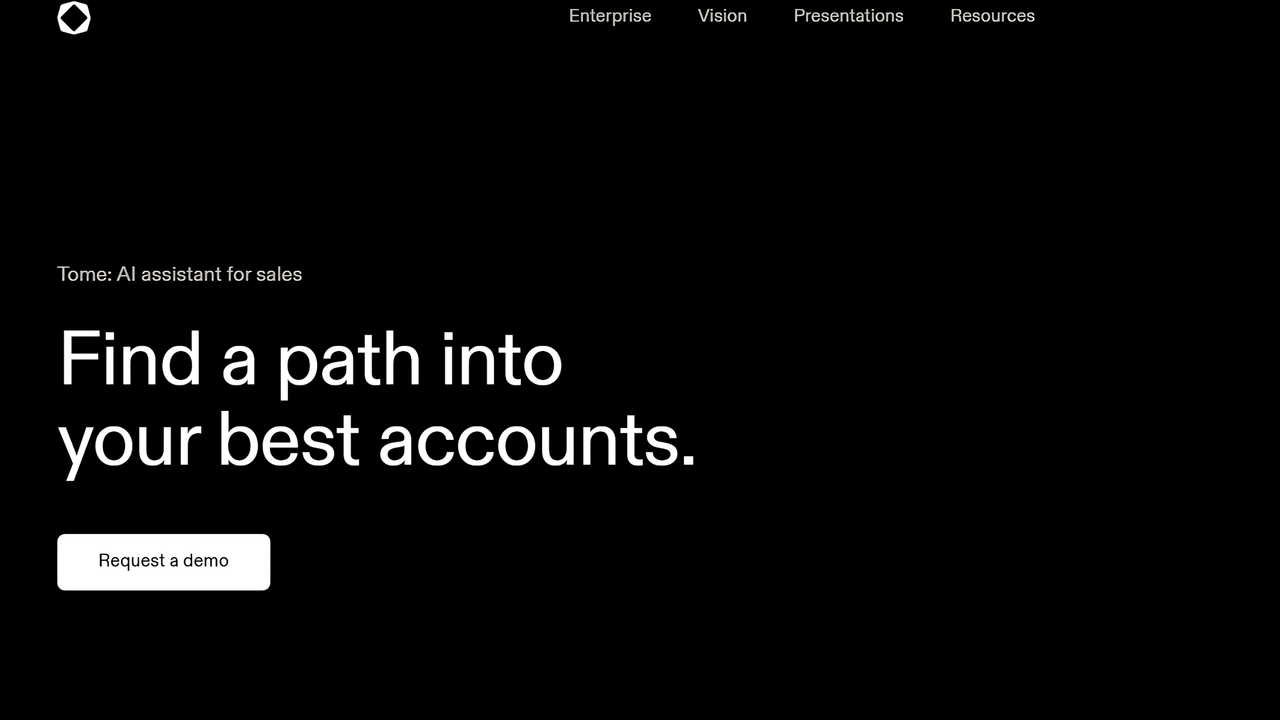
DesignScape from Visme automatically equilibria the elements on your slide to achieve the best fit, saving you time by improving the flow of your presentation.
These tools will remove the stress from designing a presentation and in making a great impression, allowing extra hours for actually thinking about your content!
9. AI Tools for Video Editing
Today, video is a must for businesses. It’s catchy, memorable, and really tells your brand’s story. Most people (84%) buy things after watching a video.
Not using video? You’re missing a lot!
In the list of AI video editing tools that have made life a lot easier, InVideo is considered the best.
This AI-driven tool helps create professional video content using templates and also expedites the editing process.
Pictory software is another outstanding video editing tool because it uses AI to transform long-form content such as blogs or podcasts into short, fascinating social media videos.
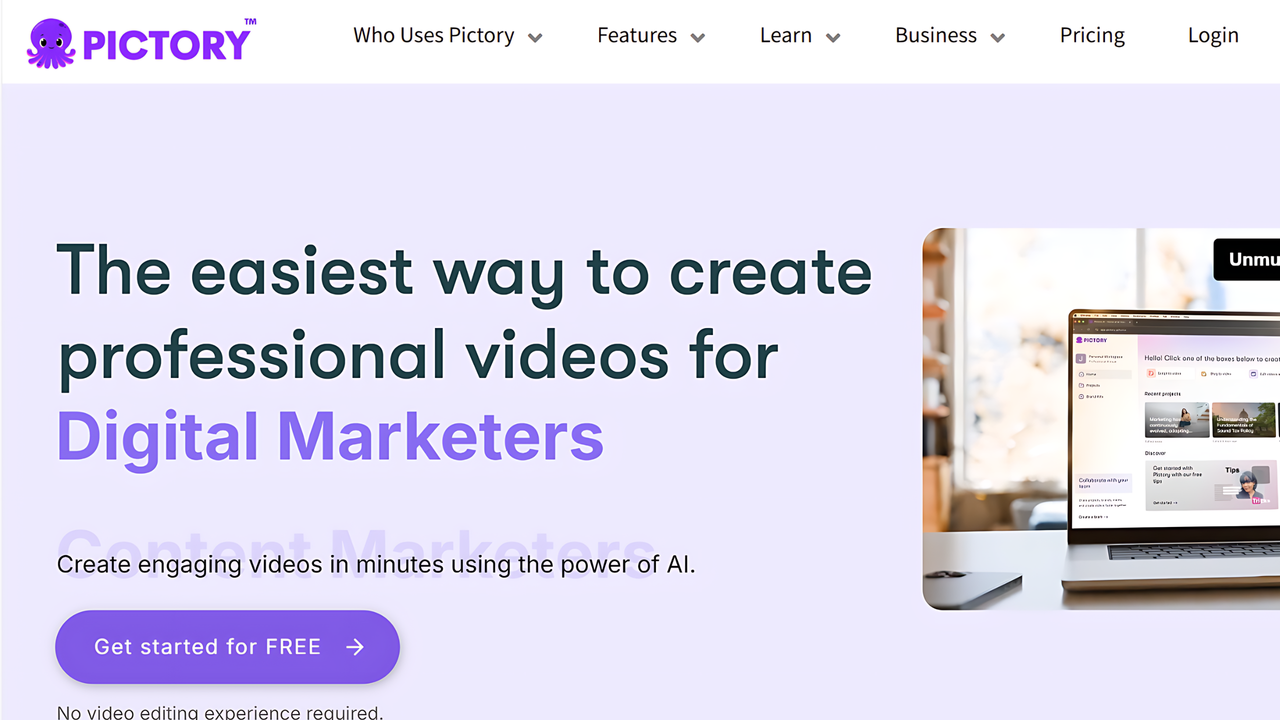
Get started here with Pictory for free.
For something quick and easy, Lumen5 is great for turning text-based content into video with basically minimal effort. It analyzes your script and picks visuals that match.
These AI tools will save time, enhance the quality of videos, and amplify marketing efforts. And since video is so effective, it’s a no-brainer to use AI in streamlining the editing!
10. AI Tools for Image Generation
Images are everything in business: First, they catch one’s attention, and through them, your message is brought across much faster.
Good visuals can increase engagement by up to 650%, so just the right image can make quite a big difference when it comes to how your brand comes off.
AI applications make it easier to create the perfect images. DALL·E 2, from OpenAI, generates images from specific descriptions.
Need a quirky image for a social media post? Just describe it, and DALL·E does the work.
Canva leverages AI in a way that empowers you to create stunning visuals even if you have no design experience.
This tool auto-generates layouts and color schemes based on your brand style.

For e-commerce, Remove.bg is a lifesaver. It removes backgrounds from product images in a split second, saving time in creating clean, professional-looking photos for online stores.
AI tools take the hassle out of creating images and help businesses stay on top of their visual game!
4 Major Importance of AI Business Tools: Why It Matters
The list of AI tools above are already here, and it’s totally changing business. They provide powerful tools for increased efficiency and customer happiness.
You’re behind if you’re not using AI in your business.
Let’s look at why AI is so important for your business now and how it can help you succeed.
- Reduces Cost:
What’s so great about AI? You save money. For example, at a time when a property management company I knew tried to lower costs.
One of the first steps they took was to replace their contract writers with AI writing tools. And it does reduce cost.
- Decides Better:
AI can do the mindless tasks, so we can do the more interesting work. It takes care of data entry, scheduling, and easy customer questions.
AI’s great at finding patterns in huge datasets—stuff humans would never spot.
This lets businesses use data insights to make decisions, not just guess.
- You Scale Faster:
Things get way more complex as they grow. AI helps companies grow without needing a huge workforce or lots of resources.
AI tools can do a lot more work, answer customer questions, and process tons of transactions easily.
You need to scale to grow your business without sacrificing quality.
- Customers Feel Happy:
AI is transforming customer interaction for businesses. Recommendations, and marketing are making things more fun for customers.
AI sees what customers are into and helps businesses give them what they need, when they need it. It keeps customers happy and coming back.
Conclusion
Businesses use AI for everything, from small tasks to major choices. Here are some common uses:
Automation: AI automates repetitive tasks, from simple data entry to really complicated workflows.
These AI tools do the office busywork for you, so you save time and make fewer mistakes in business.
Customer Service: AI is changing how businesses handle customer service.
Smart AI chatbots use NLP to understand and answer your questions like a real person, all by themselves.
Data Analysis: Every day, businesses create a mountain of data from transactions and social media.
For example, machine learning can use past data to predict what customers will do, catch online fraud, or set better prices.
Personalized Marketing: With AI, marketing’s gotten way more personal, so businesses can really nail their targeting.
AI helps companies suggest things you might like based on your past purchases, browsing history, and profile.
Marketers use AI to make their ads better by looking at customer data. You’ll sell more, customers will be happier, and your marketing will pay off more.
AI business tools are changing the world, from automating boring tasks to using big data.
Frequently Asked Questions
The following are answers to four common questions about AI business tools.
1. What are AI Business Tools, and How Can They Influence My Business?
AI business tools are software solutions that make use of artificial intelligence to automate workflows, assist decisions, retain better customer satisfaction, and smoothen the process. These apps make work easier, data smarter, customer service better, and lessen the need for manual labor.
2. What are the benefits that AI tools bring to businesses?
These would be some key benefits derived when it comes to the application of AI tools in business:
- Automation frees up your time from mundane tasks and allows you to give more attention to the meaningful ones.
- Automation and wisely distributing resources reduce costs and manpower.
- The power of AI-driven chatbots and personalized ads keeps the customer happy, loyal, and retained.
3. How will these AI-driven tools be implemented into our system?
Most AI tools easily integrate with business systems such as CRM, ERP, and marketing tools through APIs. Many of those models require training with company data in order for them to do their job at their fullest potential.
4. Are setting up costs for the AI Business tools high?
The cost of AI adoption may be anything from extremely low to stratospheric, depending on the complexity and extensiveness of the solution. Basic AI, such as chatbots or basic analytics, can be relatively cheap, especially if one uses a SaaS.